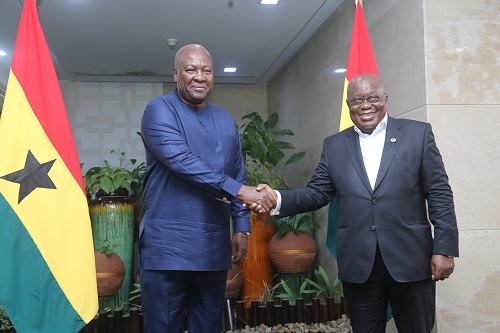
Post-election reflections: Electoral competition and the future of Ghana’s democracy
On December 7, Ghana held presidential and parliamentary elections.
Conventional wisdom prevailed in the sense that the economic pinch points felt under the New Patriotic Party (NPP) government, poor assessments of government performance in key policy areas, as well as the governance environment as captured by the three most recent Afrobarometer surveys in Ghana (2019, 2022 and 2024), all strongly suggested a probable win for the National Democratic Congress (NDC) candidate, John Dramani Mahama.
As the results showed, it was a very decisive victory for the NDC on a scale most political observers did not expect.
This marks the ninth successful election after thirty-one years of democratic governance in Ghana with several lessons that offer us an opportunity to improve our electoral system. In this op-ed piece, I share three of the many observations about our electoral processes and systems.
Rebuilding trust
First, rebuilding trust in the Electoral Commission is critical. The next four years must include intentional efforts to rebuild trust in our electoral system.
The Afrobarometer survey as well as the National Commission for Civic Education (NCCE) 2024 election year report pointed to worrying levels of trust in the EC and electoral system.
This mainly explains why political parties believe extra judicial efforts are needed during elections as stated in the previous point.
It continues to be a mystery why the NDC and the NPP, especially when in opposition, tend to raise deep suspicions about the EC and its motives.
With all the transparency mechanisms built into each step of the electoral process from voter registration to results declaration, there is still a deeply held belief that the EC holds in its power, the ability to change election outcomes contrary to the expressed will of voters.
Saying this does not absolve the EC of administrative errors and some of its decisions which have the unintended consequences of worsening suspicions.
However, this ninth election demonstrates the need to rebuild trust and confidence in the EC. The country has four years to do this before the next election.
Protecting ballot
Second, is the misplaced burden of protecting the ballot. The burden of ensuring a free and fair election appears to fall disproportionately on political parties. Each election comes with a heightened call for vigilance and the need to protect the ballot by political parties, especially the main opposition party.
This was evident in the many issues raised by the NPP in 2016 and the NDC in 2024.
This drives Ghana’s two main political parties to engage in various electoral policing activities. The scenes of teeming supporters at election collation centres or the need to build alternative command centres to collate and unofficially declare results are all part of political parties ensuring election outcomes are truly free and fair.
The need to protect the ballot and ensure electoral integrity must not create this self-imposed burden on political parties because it is the primary responsibility of the Electoral Commission (EC). Future elections must create an environment where political parties will not feel the need to engage in extra-judicial activities all in the name of protecting the ballot.
Post-election security
Third, we must improve post-election security. In preparing for elections, security concerns appear to focus more on pre-election and election-day activities. For example, look at the efforts that go into policing and securing ballot printing and transportation.
Another example is law enforcement on election day at polling stations and collation centres. We must expand our security preparations to include the immediate post-election days when a winner is announced.
The country regularly witnesses violent behaviour by party supporters after a turnover election, so it is baffling when it appears there was no plan in place to protect public property.
Furthermore, the need for strong immediate law enforcement when these acts occur is critical. It is very surprising to observe the response of law enforcement when compared to their history of strong and immediate response in other situations such as during protests by citizens.
Without a strong and immediate law enforcement response, there is nothing to deter lawless citizens from engaging in violent conduct in the immediate aftermath of electoral victories.
In Conclusion
Ghanaians have made their peace with democracy. In the most recent Afrobarometer survey (Round 10, 2024), 73 per cent expressed support for democracy while 82 per cent expressed support for choosing leaders through “regular, open, and honest elections.”
Even among Ghanaians who did not express support for democracy in the survey, elections remain their preferred method for choosing leaders. For example, among those who say, “It does not matter what kind of government is in place”, 67 per cent support using elections to choose leaders.
It is important to address these emerging electoral issues so the country can consolidate its electoral gains but also fix all challenges over the next four years.
The writer is the Project Director, Democracy Project.
